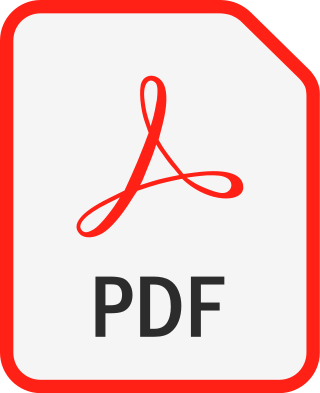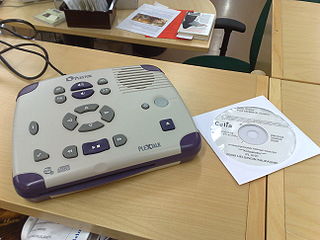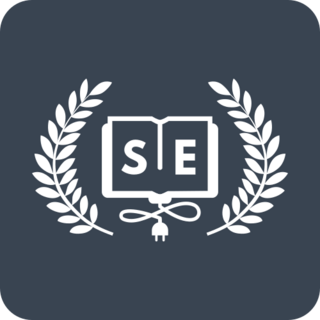
Portable Document Format (PDF), standardized as ISO 32000, is a file format developed by Adobe in 1992 to present documents, including text formatting and images, in a manner independent of application software, hardware, and operating systems. Based on the PostScript language, each PDF file encapsulates a complete description of a fixed-layout flat document, including the text, fonts, vector graphics, raster images and other information needed to display it. PDF has its roots in "The Camelot Project" initiated by Adobe co-founder John Warnock in 1991.
A document file format is a text or binary file format for storing documents on a storage media, especially for use by computers. There currently exist a multitude of incompatible document file formats.
The Open Document Format for Office Applications (ODF), also known as OpenDocument, is an open file format for word processing documents, spreadsheets, presentations and graphics and using ZIP-compressed XML files. It was developed with the aim of providing an open, XML-based file format specification for office applications. It is also the default format for documents in typical Linux distributions.
The National Information Standards Organization is a United States non-profit standards organization that develops, maintains and publishes technical standards related to publishing, bibliographic and library applications. It was founded in 1939 as the Z39 Committee, incorporated as a not-for-profit education association in 1983, and assumed its current name in 1984.
Open eBook (OEB), or formally, the Open eBook Publication Structure (OEBPS), is a legacy e-book format which has been superseded by the EPUB format. It was "based primarily on technology developed by SoftBook Press". and on XML. OEB was released with a free version belonging to public domain and a full version to be used with or without DRM by the publishing industry.

Digital accessible information system (DAISY) is a technical standard for digital audiobooks, periodicals, and computerized text. DAISY is designed to be a complete audio substitute for print material and is specifically designed for use by people with "print disabilities", including blindness, impaired vision, and dyslexia. Based on the MP3 and XML formats, the DAISY format has advanced features in addition to those of a traditional audio book. Users can search, place bookmarks, precisely navigate line by line, and regulate the speaking speed without distortion. DAISY also provides aurally accessible tables, references, and additional information. As a result, DAISY allows visually impaired listeners to navigate something as complex as an encyclopedia or textbook, otherwise impossible using conventional audio recordings.
Open XML Paper Specification is an open specification for a page description language and a fixed-document format. Microsoft developed it as the XML Paper Specification (XPS). In June 2009, Ecma International adopted it as international standard ECMA-388.

Makoto Murata is a Japanese computer scientist, Ph.D. in engineering, and Project Professor at Keio University.
The following is a comparison of e-book formats used to create and publish e-books.

Accessible publishing is an approach to publishing and book design whereby books and other texts are made available in alternative formats designed to aid or replace the reading process. It is particularly relevant for people who are blind, visually impaired or otherwise print disabled.

EPUB is an e-book file format that uses the ".epub" file extension. The term is short for electronic publication and is sometimes styled ePub. EPUB is supported by many e-readers, and compatible software is available for most smartphones, tablets, and computers. EPUB is a technical standard published by the International Digital Publishing Forum (IDPF). It became an official standard of the IDPF in September 2007, superseding the older Open eBook (OEB) standard.
The International Digital Publishing Forum (IDPF) was a trade and standards association for the digital publishing industry, set up to establish a standard for electronic book publishing. It was responsible for the EPUB standard currently used by most e-readers.
The Open Publication Distribution System (OPDS) catalog format is a syndication format for electronic publications based on Atom and HTTP. OPDS catalogs enable the aggregation, distribution, discovery, and acquisition of electronic publications. OPDS catalogs use existing or emergent open standards and conventions, with a priority on simplicity.

Sigil is free, open-source editing software for e-books in the EPUB format.
Lektz is an eBook business platform developed by AEL Data, operating in the UK and India. The platform has DRM, ebook reader applications, virtual book store, ebook conversion, elending, consumer analytics, and digital marketing solutions for small, medium-sized publishers and independent authors. Dr M.S. Mohammed Sadiq, Sr. Vice President of AEL Data, is the chief architect of the Lektz platform and it draws support from AEL Data's ePublishing, digitization, accessibility solutions, and application development services.

The Journal Article Tag Suite (JATS) is an XML format used to describe scientific literature published online. It is a technical standard developed by the National Information Standards Organization (NISO) and approved by the American National Standards Institute with the code Z39.96-2012.

Standard Ebooks is an open source, volunteer-driven project to create and publish high-quality, fully featured, and accessible e-books of works in the public domain.





